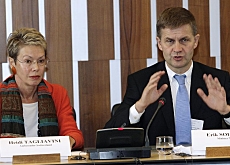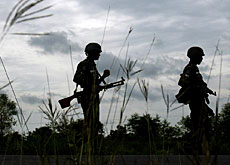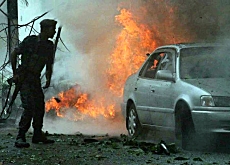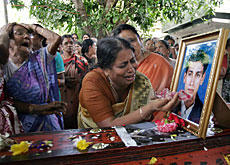Sri Lanka talks finish without agreement

Talks between the Sri Lankan government and Tamil Tiger rebels in Geneva have ended without any major breakthrough, it was announced on Sunday.
Officials said at the end of the two-day meeting, which was facilitated by Norway and hosted by Switzerland, that there had not even been an agreement on a date for a new round of talks.
This was the second time the Sri Lankan government and Tamil Tigers had met in Geneva. After discussions in February they agreed to stop all forms of violence but since then the country has slipped towards renewed civil war amid recriminations on both sides.
These latest talks were aimed at trying to halt the violence.
“No agreement was reached by the parties on how to address the humanitarian crisis,” said Erik Solheim, Norway’s minister for international development, who has been facilitating the meeting.
But he said he would continue to work with both sides “to discuss all possible ideas on how to move the peace process forward”. No date has been set for further talks.
Hopes were slim from the outset that a 2002 Norwegian-brokered cease-fire could be revived, with both sides refusing to give way on key issues, including humanitarian access to the northern Jaffna Peninsula.
The Tamil Tiger delegation announced they would not join new peace talks until the Sri Lankan government opens the highway into the peninsula.
Sri Lankan government delegation leader Nimal Siripala de Silva said the Tamil Tigers had refused their offer of sea access and that the “ball was now in their court”.
Human rights
Opening the negotiations on Saturday, Swiss ambassador Heidi Tagliavini called for both sides in the longstanding conflict to respect international human rights law.
“Switzerland, as the depositary state of the Geneva Conventions, feels it cannot forgo its responsibility to remind the parties to the conflict of their obligations to respect international humanitarian law, in particular to protect civilians from the effects of armed conflict,” Tagliavini said.
The Geneva talks would be a success if “the situation of the civilian population improves and the violence subsides,” she added.
Both the government and Liberation Tigers of Tamil Eelam (LTTE), who are fighting for a separate homeland, blame each other for the upsurge in fighting that has seen up to 1,000 combatants and civilians killed since July.
Although both sides insist the 2002 ceasefire remains in place, there is open conflict in the north and east of the country.
Observers had reservations about the Geneva meeting, with many believing that the best that could have come out of it was that both parties would agree to hold further talks. Both sides had expressed this hope before the meeting.
swissinfo with agencies

More
Good offices
The Swiss government provided logistical support for the meeting, which was facilitated by Norwegian diplomats.
Swiss ambassador Heidi Tagliavini opened the talks on Saturday alongside Norway’s minister for international development, Erik Solheim.
In March this year the Swiss government doubled its aid commitment for post-tsunami reconstruction in Sri Lanka, pledging a further SFr10.9 million ($8.7 million).
But the return to violence has seriously disrupted relief and reconstruction work in conflict areas – 17 aid workers were shot dead in the northeast in August.
Civil war broke out in 1983.
65,000 people were killed before a Norwegian-brokered truce in 2002.
The rebels want a self-ruled homeland for the country’s minority Tamils.
The government says it can offer autonomy, but not a separate state.
More than 35,000 Sri Lankans, mostly Tamils, live in Switzerland.

In compliance with the JTI standards
More: SWI swissinfo.ch certified by the Journalism Trust Initiative



You can find an overview of ongoing debates with our journalists here. Please join us!
If you want to start a conversation about a topic raised in this article or want to report factual errors, email us at english@swissinfo.ch.